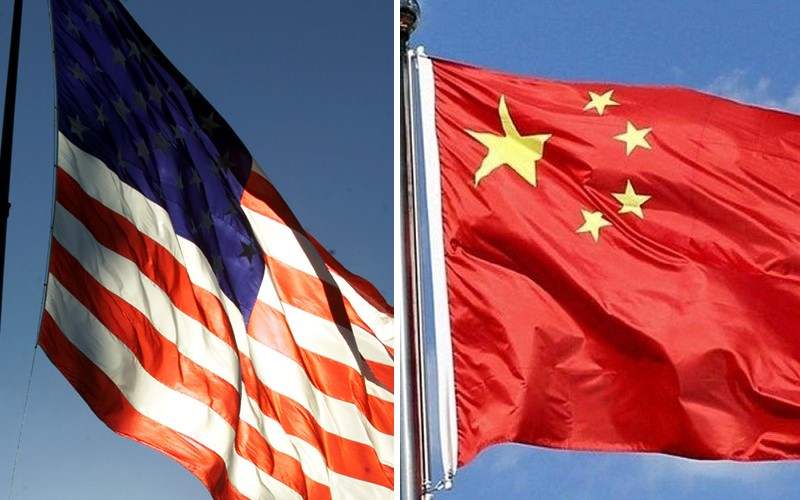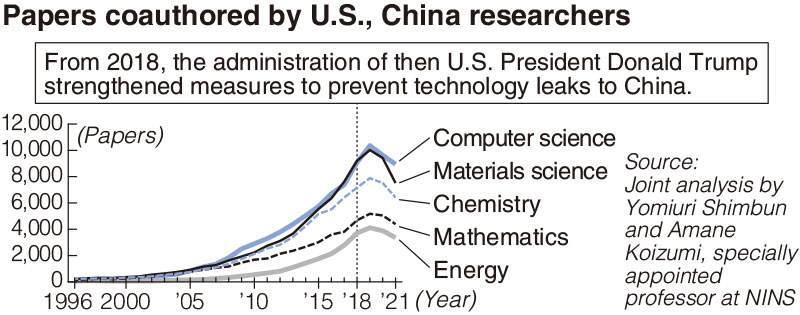
China’s national flag (R) and A united states flag (L)
21:00 JST, November 6, 2022
Fewer papers coauthored by researchers in the United States and China have been carried in Western and other academic journals recently in fields related to cutting-edge technologies, according to data analyzed by the Yomiuri Shimbun and an expert in analyzing research capabilities.
Such research efforts can strengthen military power and industrial competitiveness.
About 59,000 papers were coauthored by researchers in the United States and China in 2021. Of this number, papers in eight fields, including materials science, energy, and computer science, declined by 14% to 25% from 2019.
Stricter measures implemented by the administration of former U.S. President Donald Trump to prevent leaks of technology to China are believed to be a factor.
Amid worsening U.S.-China relations in areas such as security and the economy, the decline in coauthored papers confirms the growing division in fields of scientific research as well.
This downward trend is likely to continue, as the current administration of U.S. President Joe Biden has also strengthened its posture against the administration led by Chinese President Xi Jinping, which is seeking to make China a great power.
Internationally coauthored papers are written jointly by researchers belonging to universities or institutions in different countries. The number of such papers is considered a barometer of the fruits of international research collaboration.
Japanese researchers are involved in a lower percentage of coauthored papers than researchers in other developed countries, prompting this nation to take steps to increase international joint research.
The Yomiuri Shimbun surveyed articles bilaterally coauthored by researechers in Japan, the United States and China, and carried in academic journals between 1996 and 2021. It did so in cooperation with Amane Koizumi, a specially appointed professor at the National Institutes of Natural Sciences (NINS), who specializes in analyzing research capabilities.
Scopus — an abstract and citation database created by Elsevier, a major academic publishing company headquartered in the Netherlands — was used in the analysis. The database contains about 88 million peer-reviewed papers from about 27,000 academic journals.

From 2000 to 2019, the annual number of all coauthored papers involving universities and research institutes in the United States and China increased by 8% to 40% compared to each previous year. In 2020, however, the total number remained almost the same and the 2021 figure decreased by 5%.
Among 27 fields, the number of coauthored papers in areas related to advanced technologies declined markedly from 2019 onward.
About 7,500 papers were coauthored by researchers in the United States and China in the field of materials science in 2021, showing the largest decrease of 25% compared to 2019. The number of papers in chemistry was about 6,400, down 19%; energy accounted for 3,400, down 18%; and computer science saw about 8,900 for a drop of 14%.
These are fields directly related to advanced materials, semiconductors and artificial intelligence.
In contrast, coauthored papers continued to increase in fields less closely linked to advanced technologies, such as social sciences, humanities and psychology. The number of coauthored papers among researchers in Japan and China, and Japan and the United States, as a whole also continued upward, and the impact of the COVID-19 pandemic is considered to be limited.
Having been increasingly wary of China from around 2018, the former Trump administration implemented such measures as export controls on technology and restrictions on the participation of U.S. researchers in programs hosted by China and other countries to bring in foreign research personnel.
“The U.S. policy toward China has surely had an impact on the trends. The blow to China may be significant,” said Atsushi Sunami, president of the Sasakawa Peace Foundation. Sunami is well versed in the science and technology policies of both the United States and China.
Moves to foster and protect advanced technologies are accelerating in Japan as well, as seen by the enactment of the Economic Security Promotion Law in May this year, with China and other countries in mind.
“As Japan advances its economic security policy, the country needs to pay close attention to the trends in joint research,” Sunami said.
Top Articles in Science & Nature
-

Japan Institute to Use Domestic Commercial Optical Lattice Clock to Set Japan Standard Time
-

Japan to Face Shortfall of 3.39 Million Workers in AI, Robotics in 2040; Clerical Workers Seen to Be in Surplus
-

Record 700 Startups to Gather at SusHi Tech Tokyo in April; Event Will Center on Themes Like Artificial Intelligence and Robotics
-

iPS Treatments Pass Key Milestone, but Broader Applications Far from Guaranteed
-

iPS Cell Products for Parkinson’s, Heart Disease OK’d for Commercialization by Japan Health Ministry Panel
JN ACCESS RANKING
-

Japan PM Takaichi’s Cabinet Resigns en Masse
-

Japan Institute to Use Domestic Commercial Optical Lattice Clock to Set Japan Standard Time
-

Israeli Ambassador to Japan Speaks about Japan’s Role in the Reconstruction of Gaza
-

Man Infected with Measles Reportedly Dined at Restaurant in Tokyo Station
-

Videos Plagiarized, Reposted with False Subtitles Claiming ‘Ryukyu Belongs to China’; Anti-China False Information Also Posted in Japan





















